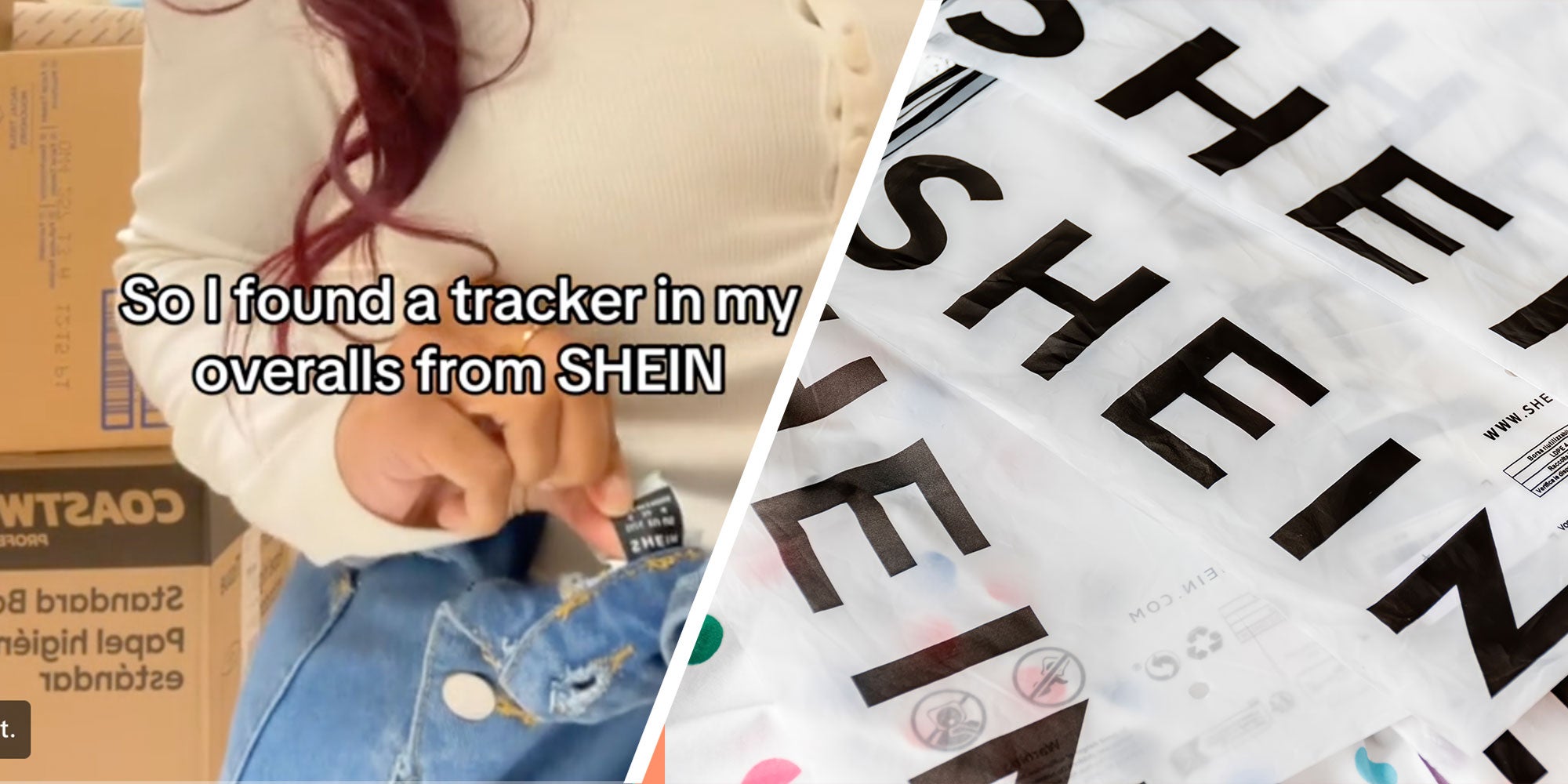Unveiling The Truth: Tracker Found In Shein Clothes
Let's talk about something that's got everyone buzzing lately – the discovery of trackers in Shein clothes. It’s one of those headlines that grabs your attention and doesn’t let go. Imagine this: you’re just shopping for some cute outfits online, minding your own business, and then BAM! You hear rumors that your favorite fast-fashion brand might be hiding tech in their clothes that could track your every move. Sounds like a plot twist straight out of a spy movie, right?
But here’s the deal: we’re not here to jump to conclusions or spread panic. What we’re here to do is dive deep into the facts, sift through the noise, and give you the real scoop on whether or not these "trackers" are legit. Because let’s face it, if there’s something sketchy going on, you deserve to know.
Fast fashion has always been a hot topic, and brands like Shein have been at the center of debates over sustainability, ethics, and transparency. But this tracker business? That’s a whole new level of controversy. So, buckle up because we’re about to break it all down for you.
Read also:How To Remove Collaborator On Instagram After Posting The Ultimate Guide
What’s the Fuss About Trackers in Shein Clothes?
First things first, what exactly are we talking about when we say "trackers"? According to reports that started floating around earlier this year, some Shein customers claimed they found small electronic devices embedded in their clothing. These devices were allegedly RFID tags or even GPS trackers, which sparked fears about privacy invasion and data security. Crazy, right?
Now, before you start tearing apart your wardrobe in search of hidden tech, let’s clarify a few things. RFID tags are actually pretty common in retail. They’re used by stores to manage inventory and prevent theft. But the issue here is that some customers felt they weren’t adequately informed about these tags, leading to mistrust and outrage.
Why Are People So Upset?
Here’s the kicker: most people don’t expect to find electronics in their clothes, especially without being told upfront. Imagine pulling a shirt out of your drawer and finding a tiny chip inside. Creepy vibes, right? The problem isn’t necessarily the technology itself but the lack of transparency from Shein about why it’s there and how it works.
Shein’s response to these allegations has been mixed. While they’ve acknowledged using RFID tags for inventory purposes, they’ve denied any claims of GPS tracking. Still, the damage was done, and trust issues have since become a major talking point among consumers.
Understanding RFID Tags: Are They Harmless or Harmful?
Let’s break down what RFID tags actually are and why they’re used in retail. RFID stands for Radio Frequency Identification, and it’s basically a small chip that can store information and communicate with scanners. Think of it like a barcode on steroids.
For retailers, RFID tags are a game-changer. They help track stock levels, streamline operations, and reduce losses due to theft. But for consumers, the idea of wearing clothes with embedded chips can feel invasive, especially if they’re not aware of their presence.
Read also:Chandler Youth Theatre Where Young Talents Shine Brighter Than Ever
How Do RFID Tags Work?
RFID tags work by emitting a weak radio signal that can be picked up by specialized readers. There are two main types:
- Passive RFID tags: These don’t have their own power source and only work when scanned by a reader.
- Active RFID tags: These have their own battery and can transmit signals over longer distances.
Shein has stated that they only use passive RFID tags, which are generally considered harmless and cannot track your location. But the concern remains: how do we know for sure?
Is Shein Violating Privacy Laws?
This is where things get tricky. Privacy laws vary from country to country, and what’s allowed in one place might be illegal in another. In the U.S., for example, companies are required to inform customers if they’re using RFID tags. Failure to do so could result in legal consequences.
Shein, being a global brand, operates in multiple jurisdictions, which complicates matters further. While they may comply with local laws in certain regions, they might fall short in others. This inconsistency has left many consumers feeling uneasy and unsure of their rights.
What Are the Legal Implications?
Depending on where you live, the discovery of RFID tags in your clothes could have serious legal implications. Here are a few things to consider:
- In the EU, GDPR (General Data Protection Regulation) requires companies to obtain explicit consent before collecting personal data.
- In the U.S., the FTC (Federal Trade Commission) enforces rules around consumer protection and privacy.
- In some countries, embedding tracking devices in products without disclosure could be considered a criminal offense.
So, if you live in a region with strict privacy laws, you might have grounds to take action against Shein. But again, it all depends on the specifics of your situation.
What Can You Do to Protect Yourself?
Whether or not Shein’s RFID tags pose a real threat, it’s always a good idea to take steps to protect your privacy. Here’s what you can do:
- Inspect your clothes carefully after purchase. Look for any unusual bumps or tags that might indicate the presence of an RFID chip.
- Use an RFID-blocking wallet or bag to shield your cards and devices from unwanted scanning.
- If you find an RFID tag in your clothes, you can deactivate it using a strong magnet or by cutting the antenna wire inside the chip.
Remember, knowledge is power. The more you know about how these technologies work, the better equipped you’ll be to protect yourself.
Shein’s Response to the Controversy
Since the tracker scandal broke, Shein has been quick to issue statements addressing the concerns. They’ve emphasized that their RFID tags are purely for inventory management and pose no threat to consumer privacy. But have they done enough to restore trust?
Some argue that Shein needs to go further by implementing clearer labeling and offering opt-out options for customers who prefer not to purchase items with RFID tags. Others believe that transparency alone won’t cut it and that Shein needs to rethink its entire approach to data collection and customer relations.
Do Consumers Trust Shein Anymore?
Trust is a fragile thing, and once it’s broken, it’s hard to rebuild. For many Shein customers, the tracker controversy has been the final straw. Social media is filled with posts from people vowing to boycott the brand and switch to more ethical alternatives.
But not everyone is convinced. Some argue that Shein’s prices and selection are too good to give up, while others believe that the risk of RFID tags is minimal compared to the benefits of fast fashion. Where do you stand?
The Broader Implications for Fast Fashion
This whole tracker debacle isn’t just about Shein; it’s a reflection of larger issues within the fast-fashion industry. Brands are under increasing pressure to balance profit with ethics, and consumers are becoming more aware of the impact of their purchasing decisions.
As technology continues to evolve, we can expect to see more innovations in the retail space. But with every new advancement comes the potential for misuse. It’s up to us as consumers to stay informed and demand accountability from the brands we support.
What Does the Future Hold?
The future of fast fashion is uncertain, but one thing is clear: transparency will be key. Brands that fail to adapt to changing consumer expectations risk losing market share to competitors who prioritize ethics and sustainability.
Shein has a chance to turn this controversy into an opportunity by leading the charge in responsible tech integration. Will they rise to the occasion, or will they fall victim to their own hubris? Only time will tell.
Final Thoughts
So, what’s the verdict on trackers in Shein clothes? While there’s no definitive proof that Shein is using GPS trackers, the presence of RFID tags has undoubtedly raised eyebrows. Whether or not these tags pose a real threat to your privacy, the lack of transparency has damaged trust and left many consumers feeling uneasy.
As we’ve seen, the issue goes beyond Shein and highlights broader concerns about data privacy and ethical business practices. It’s a wake-up call for all of us to be more mindful of the brands we support and the products we buy.
So, what’s next? If you’re concerned about RFID tags, take the steps we’ve outlined to protect yourself. And if you’re fed up with Shein’s lack of transparency, consider exploring alternative brands that align with your values. After all, every purchase you make is a vote for the kind of world you want to live in.
Before you go, we’d love to hear your thoughts. Have you found RFID tags in your Shein clothes? What do you think about the brand’s response to the controversy? Drop us a comment below and let’s keep the conversation going!
Table of Contents
- What’s the Fuss About Trackers in Shein Clothes?
- Understanding RFID Tags: Are They Harmless or Harmful?
- Is Shein Violating Privacy Laws?
- What Can You Do to Protect Yourself?
- Shein’s Response to the Controversy
- The Broader Implications for Fast Fashion
- Final Thoughts


